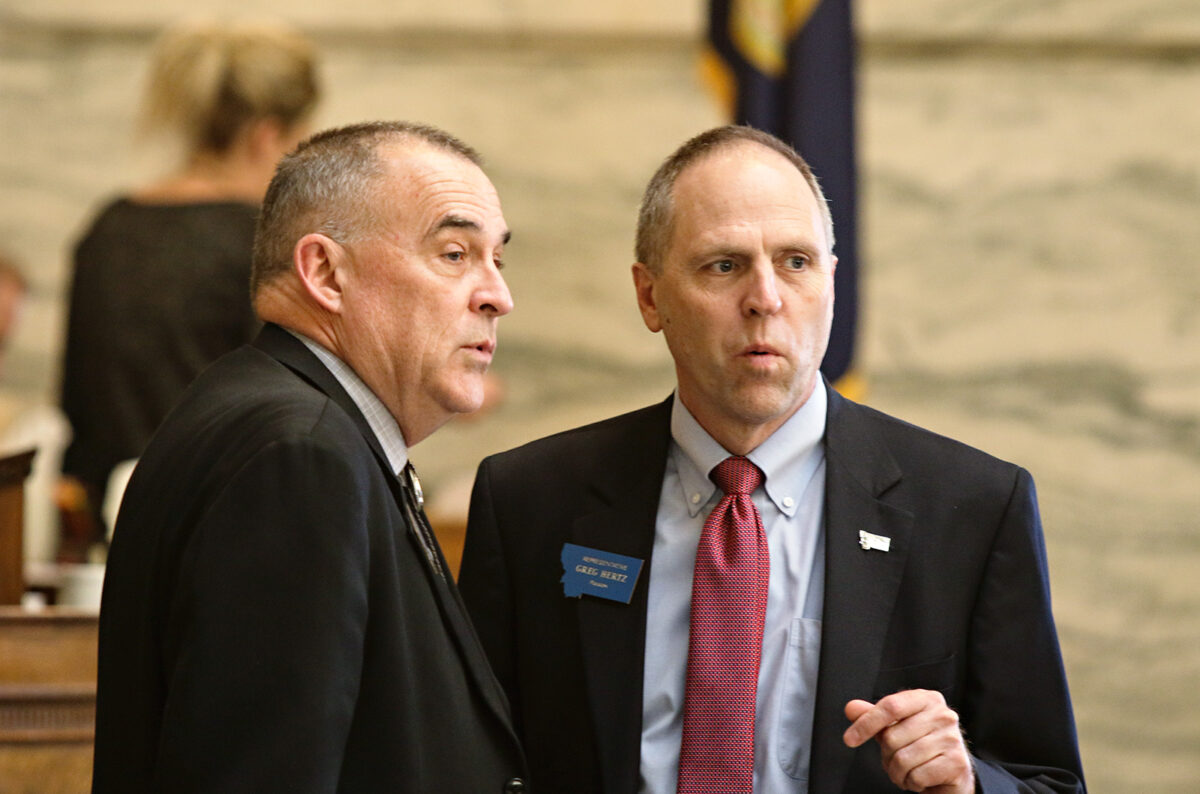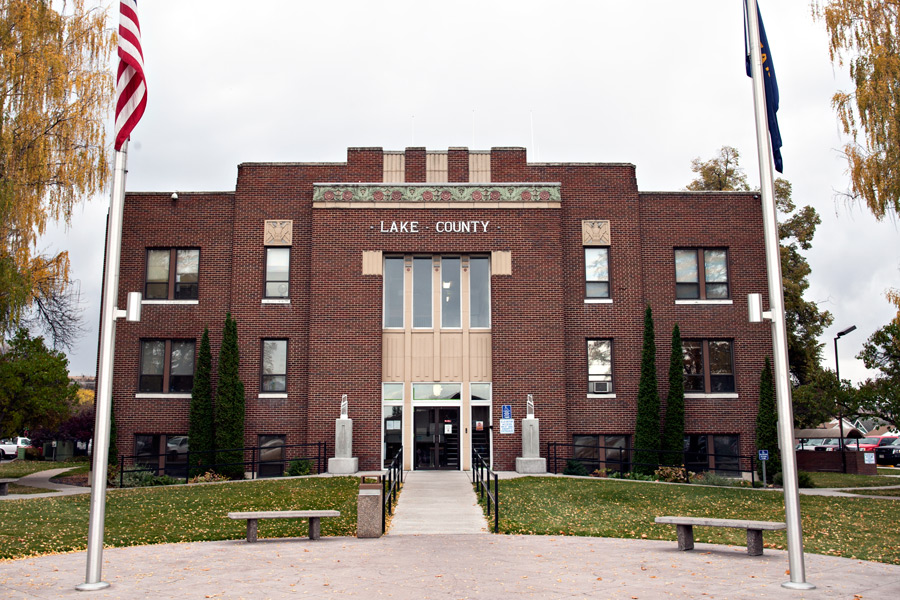Footing the Bill for Lake County’s ‘Unfunded Mandate’
Gov. Greg Gianforte vetoed funding for Lake County to carry out law enforcement on the Flathead Indian Reservation, reviving debates over a 1950s law that dictates criminal prosecution on Native lands
By Denali Sagner
After Gov. Greg Gianforte last month vetoed a bill that would have appropriated $5 million to Lake County to fund law enforcement on the Flathead Indian Reservation, policing on the reservation, as well as the county’s relationship with the state and the Confederated Salish and Kootenai Tribes (CSKT), remains in limbo.
The governor’s veto marks yet another roadblock for Lake County in a prolonged battle over who is responsible for handling crimes on the Flathead Reservation and, most recently, who is accountable for footing the bill. While the state of Montana has maintained criminal jurisdiction on the reservation for 50 years under federal Public Law 280, Lake County has long carried out the policing and prosecution of felonies on behalf of the state.
Now, the county says it will withdraw from its law enforcement responsibilities entirely unless the state agrees to cover the costs.
As Lake County awaits the results of a veto override poll and a pending lawsuit against the state, debates persist about how to carry out an agreement that some tribal members say never should have been implemented five decades ago.
In 1963, Montana elected to bring the Flathead Indian Reservation under Public Law 280 — a 1950s federal law that granted certain states criminal jurisdiction over Native reservations. In 1965, the CSKT passed a formal tribal ordinance agreeing to adopt PL 280, turning over criminal prosecution on the reservation to the state of Montana, which would be led by Lake County, where approximately two-thirds of the reservation’s 1.2 million acres are located.
The state’s six other Native reservations — the Crow, Northern Cheyenne, Fort Peck, Fort Belknap, Rocky Boy’s and Blackfeet — did not enter into PL 280 and remain under tribal and federal criminal jurisdiction.

In 1994, the CSKT reclaimed jurisdiction over misdemeanor crimes committed by tribal members within the reservation, leaving only felony prosecution to the state and county.
Though the state of Montana agreed to assume the administrative and financial burdens of law enforcement on the Flathead Reservation with the adoption of PL 280, Lake County officials have long argued that the state has failed to fulfill its obligation, instead placing an undue financial strain on the county and the CSKT.
In the lawsuit Lake County v. Montana, which was filed in the state’s 20th Judicial District Court in 2022, Lake County officials argued that the county pays over $4.3 million per year for felony criminal jurisdiction, including the costs of prosecution of crimes, youth placement and detention, operation and maintenance of detention facilities and law enforcement personnel.
The lawsuit also stated that the CSKT spends over $4 million per year to fulfill misdemeanor criminal jurisdiction on the reservation.
According to county officials, the county has been forced to divert funds from its road and planning departments, as well as the district clerk’s office, to pay for law enforcement. Lake County Commissioner Bill Barron said that nearly every office in the county is operating without sufficient staff, which he attributes to high policing costs on the Flathead Reservation.
During the 2017 Legislative session, Sen. Greg Hertz, R-Polson, who was then serving in the Montana House of Representatives, introduced a bill that would have required the Montana Department of Justice reimburse Lake County for law enforcement costs to the tune of approximately $4 million. The bill died in the House.
In the 2021 session, the Legislature passed a bill introduced by Rep. Joe Read, R-Ronan, that would have reimbursed the county. The bill included an appropriation of $2.2 million per year, which was reduced to $1 through a late amendment, a move Lake County officials characterized as a snub.
Read in 2023 attempted again to move a bill through the Legislature to offset Lake County’s policing costs, bringing House Bill 479, which would create a task force to create a permanent solution to the disputes between the county, CSKT and state, and would appropriate $2.5 million to Lake County per year for two years while the task force ironed out a solution.

After passing the House and Senate largely on party lines, with most Republicans voting for the bill and most Democrats voting against it, Gianforte on May 17 vetoed the bill.
In his veto letter, the governor said that when Lake County agreed to the implementation of PL 280 in 1965, it “agreed to bear the corresponding costs for the benefit of its residents” and for nearly 50 years, the county never received or expected contributions from the state for law enforcement costs.
“Lake County has advocated for and supported the jurisdiction granted to it under PL-280 to prosecute crimes committed by tribal members and has willingly accepted the corresponding financial responsibilities. In the past few years, Lake County has inexplicably changed course, asserting that the State should be responsible for all costs associated with the implementation of PL-280 — while the county retains full control. Lake County wants all of the benefits of exercising jurisdiction under PL-280 while shifting all financial responsibility to the state,” the letter read.
The governor also said that the bill creates a “slippery slope,” where Lake County and other counties in Montana experiencing financial pressures from law enforcement costs will simply petition the state for money, a characterization Lake County legislators and county officials deny.
Though Lake County officials have threatened to pull out of the Flathead Reservation if they are not compensated, the county has repeatedly characterized the current policing agreement as the only formula that works, given the state’s lack of law enforcement resources to take over crime control on the reservation.
There is no statewide police force in Montana aside from the Montana Highway Patrol. The state lacks patrol and prosecutorial resources in Lake County, such as state-run detention facilities, law enforcement officers and prosecutorial offices. Without Lake County’s law enforcement resources, the county’s lawsuit alleges, the state would be unable to control crime in and around the reservation.

“In the absence of Lake County’s provision of services, Montana citizens living and traveling through Lake County would face a law enforcement vacuum of catastrophic proportions,” the lawsuit states.
“If the county walks, and the state’s responsible for it, the state is in no position to actually pick up that task,” Read said.
Because of the state’s lack of resources to take over law enforcement, county officials have agreed to continue providing policing resources, so long as they are reimbursed for the costs.
“The amount of funding will determine how we move forward, but we would like to stay in it. We just can’t afford it,” Barron said.
For tribal members, however, arguments between Lake County and the state over House Bill 479 are overshadowed by the unjust nature of Public Law 280 as a whole.
Though the CSKT declined to comment on the ongoing conflict — and tribal officials have remained largely silent as the county has tussled with the state over law enforcement responsibilities — tribal members in legislative hearings rebuked any agreement grounded in PL 280.
“From a tribal standpoint, subjecting ourselves to Public Law 280 is a zero-sum game, as it makes the Salish and Kootenai persons subservient,” Ethan Friedlander, who described himself as a “survivor of the failed policy that is PL 280,” said during an April 12 Senate Judiciary Committee hearing on HB 479.
“PL 280 is the least efficient way to prevent crime and provide restorative justice to anybody. However, it is the most optimal way, just short of violence, to remove a person from their home, hunting and gathering grounds and repurposing it as surplus land,” Friedlander continued, describing a pattern of mass and unjust incarceration of Native individuals on the reservation.

He added that silence from the CSKT does not signal a tacit support of the agreement, but rather a disengagement from the conflict, which hinges on an unjust governance principle that should have never been written into law.
During the same hearing, Salish tribal member Lex Pierre said that the construction of PL 280 “is designed to encroach and oppress the treaty-recognized sovereign status and the rights to protect our exclusivity.”
Keegan Medrano, director of policy and advocacy for the American Civil Liberties Union (ACLU) of Montana, spoke on behalf of the ACLU in opposition to the bill.
“PL 280 is that invitation by the federal government for intrusion by the state government into the civil and criminal jurisdiction of tribal peoples that subverts their inherent sovereignty and which leaves everyone less safe,” Medrano said, calling the law “a dysfunctional, unfunded mandate” that was written in the 1950’s with the ultimate goal of extinguishing Native tribes in the United States.
Medrano called PL 280 a “forced, contrived marriage that has no dowry,” and said that despite testimony from Lake County officials about its effectiveness, the law has done little to keep Native communities safe.
The ACLU policy director cited a class action lawsuit filed in 2021 against Lake County alleging inhumane and discriminatory conditions at the county jail, the continued crisis of missing and murdered Indigenous women on the Flathead Reservation and hate crimes committed against tribal members.

After the governor’s veto, the state of law enforcement on the reservation remains uncertain.
A veto override poll for House Bill 479 was sent to legislators earlier this month. If two-thirds of the Legislature votes to override the governor’s veto, the bill will become law, though Read acknowledged that “it’s going to be slim,” given the bill’s passage on near party lines during the session.
The Lake County commissioners on May 25 voted to temporarily remain in PL 280, despite their earlier declaration to pull out of the agreement. The commissioners said they will stay in the agreement until their lawsuit against the state is settled. The trial is set to begin on July 19.
As the county awaits the verdict of both the veto override poll and the lawsuit, Hertz called the governor’s veto “a gamble.”
While House Bill 479 appropriated $2.5 million to Lake County annually for two years, the state could be ordered to pay a far greater sum if the courts rule in Lake County’s favor.
Barron said that the county plans to pull out of the agreement if they do not receive funding through House Bill 479 or the lawsuit, leaving felony law enforcement to the state and the CSKT.
“If it is determined that it is the State’s obligation to fund Public Law 280, we will continue using that funding to maintain the model that has been so successful. If the Court determines it is not the State’s obligation to provide funding, the County will withdraw from Public Law 280 and require the State of Montana to step in to fulfill its obligations,” the county commissioners wrote in a letter.
The commissioners have stated that they believe the governor has no plan in place for the state to assume criminal jurisdiction on the Flathead Reservation if Lake County withdraws.
Gianforte told the Beacon on June 9, “We need to get the county officials and the tribal government to the table to figure this out.”